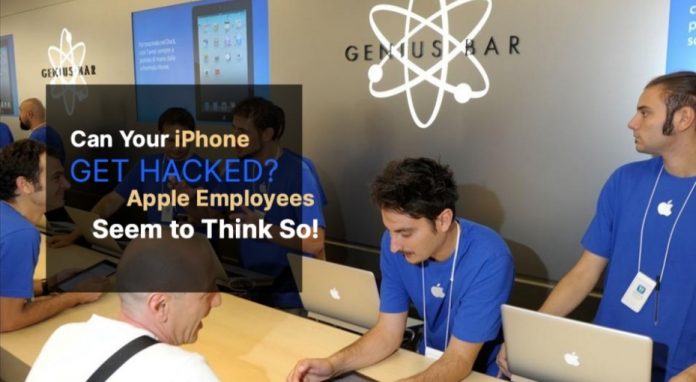Recently, there has been a rift among Apple and its employees. The reason it seems that their iPhones are getting spied on by Apple. According to Washington Post, many Apple employees are not happy and have quietly unionized due to their wages remaining the same despite the tech giant pulling in large profits.
Employees have started showing their concerns as their privacy got invaded by Apple. They believe it is possible to remotely track a smartphone steal passwords and other crucial information, including the user contacts and information. Protesters have switched to Android to avoid Apple’s spying. So let us see what caused the Apple employees to feel their iPhones got spied on.
Apple’s had a history of abusing employee rights, including unwarranted spying. Just last year, Ashley Gjøvik, Apple’s senior engineering program manager got fired because she wanted to have a written record of the conversation with senior management. She alleged that she had been sexually harassed at the company and was against employee surveillance. She wrote, “Employees are closely monitored and our data hoarded in the name of secrecy and quality.” She added the company has a culture of surveillance, intimidation, and alienation. So to assess the truth, we must first look at how likely it is to have an iPhone hacked.
How to hack an iPhone?
Despite popular opinion on iPhones being hack-proof, the truth is, iPhones are hackable like every modern device. When the owner of a device loses control of the data and access to a third party, they become a victim of hacking. And the severity of the hack depends on the hacker’s skills and intentions. So let us check out how an iPhone might get hacked.
Malware attacks
Opening a suspicious website or clicking on a shady link can open up your iPhone to potential hacks through a planned malware attack. Malware has existed since the dawn of the Internet. And just like old malware attacks focused on connected computers, modern malware campaigns target smartphones. Be on the lookout for long URLs with out-of-place symbols and characters. Also, look out for suspicious numbers, incorrect spelling, and low-resolution logos.
Fraudulent Apps
Apple calls its ecosystem a walled garden, and rightfully so. It’s a closed ecosystem meaning that Apple limits its products’ interactivity with external programs, systems, and users. The same goes for its App Store. Apple has a strict policy on the type of applications allowed on its digital app store but the App Store isn’t completely foolproof.
There are plenty of suspicious apps on the app store that is there just to harvest user data. They often serve under the guise of utility apps like wallpaper changers, flashlight, or a file manager app. A good way to assess the validity of these apps is to check what permissions they require. For example, if a file manager app wants to access your phone’s microphone or a flashlight app wants access to the contacts and messages folder.
Remote monitoring apps
Productivity is one of the most vital parts of a business. It can be the key difference between a successful business and one that is not. Although success can hinge on the employees’ skills and knowledge, it also depends on their ability to remain productive in the age of distraction. It is why if you’re an employee you might want to use a remote monitoring app to keep a finger on your employees’ productivity levels.
These apps primarily get used to measuring employee productivity by ensuring they do not spend their work time visiting social media, surfing the Internet, sending long texts, or making unnecessary phone calls. Remote monitoring apps can track location view texts, call logs, screenshots, and emails. But these features can be abused too. A hacker could install such an app for nonproductive reasons and spy on an iPhone.
The individual only needs physical access to the device and your password to install the app on your phone. Often these apps do not show up in the app tray or the list of running apps as they operate in stealth mode. Luckily, there’s an easy way to protect against these apps. A factory reinstall completely removes them from your phone.
Human error
Human error is a major fact in falling victim to a cyber threat. Hackers use malware, phishing scams, and ransomware threats to lure users into clicking their links by making a ludicrous offer such as winning a million dollars giveaway. Remember the golden rule, if something feels too good to be true, it probably isn’t.
But iPhone users can get carried away sometimes and may feel they want to jailbreak their device. However, if you’re thinking of jailbreaking your iPhone (removing the software limits that come with iOS, you’ll be exposing yourself to potential software vulnerabilities. You will bypass some of Apple’s existing security protections exposing yourself to vulnerabilities. It is possible to download incompatible spyware or malware program on a jailbroken phone. It is also how remote takeovers with iPhones can happen. A jailbroken phone should get avoided at all costs since malicious apps can run unnoticed.
Even using an iCloud to backup your data might not be enough since hackers don’t need to hack your phone if they have your password because they can download a backup from the cloud. So, if you use iCloud to back up your phone, make sure you use a strong password.
Targeted attacks
Journalists and activists are the most vulnerable to such attacks. One type of targeted hack works like this: hackers take advantage of unknown system vulnerabilities in the iOS operating system that even the developers are unaware of who then can exploit this information to install malware to obtain data from targeted sources.
It is a highly sophisticated collection of hacks, in which users might not even know how they get targeted. Hackers can theoretically send a blank text, and the phone would become compromised without you even having to interact with it. And Apple has been a victim of such attacks in the past.
‘FORCED ENTRY’ is a zero-day zero-click iMessage exploit identified as CVE-2021-30860. It’s the same flaw used in the Pegasus attacks on human rights activists from Bahrain. The NSO Group developed spyware that bypassed Apple’s Blastdoor security algorithm.
The flaws get referred to as zero-day exploits since the developers are unaware of the existence of the security loophole. It is why it is recommended not to download an update unless it has been out for a few weeks. So that all vulnerabilities can get discovered and dealt with by the developers.
Apple has released security updates to address two zero-day vulnerabilities that were exploited in the wild on iPhones and Macs.
Were Apple employees spied on?
It would be quite the irony if Apple used its technology to spy on its employees’ iPhones but entirely plausible given how easy it can be to hack an iPhone by exploiting the system’s vulnerabilities in a malware attack or using a remote monitoring app.
You got hacked if you notice your iPhone running slow or feel your battery dies quicker. So always be prepared for the worst as you never know when your phone might get hacked.







